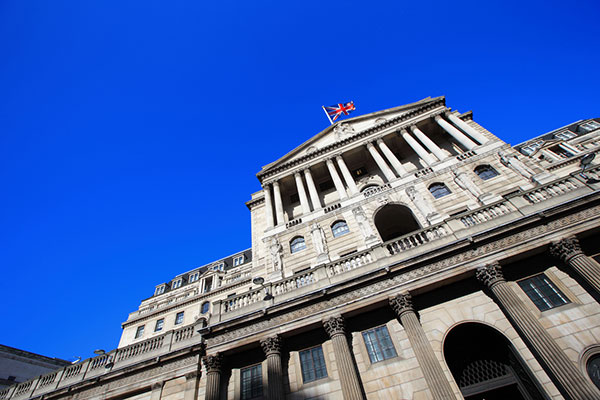Bank of England warns of economic crash and unemployment spike
Britain's central bank estimates that the economy could shrink by 14% in 2020.
7th May 2020 10:35
by Hannah Smith from interactive investor
Britain's central bank estimates that the economy could shrink by 14% in 2020.

The UK economy will nosedive this year while unemployment soars, the Bank of England has predicted in a bleak forecast.
GDP will contract by 25% in the second quarter, leading to a 14% fall in GDP growth for 2020 as a whole. Unemployment will hit 9% before gradually falling back to more normal levels by 2022.
Meanwhile, business investment and sales are expected to halve, and households will cut their spending by a third. Inflation will fall to 1% in the next few months, reflecting the moves seen in the oil price, which turned negative in April.
- Covid crash: which markets have done best and worst?
However, the Bank is optimistically predicting a return to growth by 2022, with 3% GDP growth expected.
In its Monetary Policy Report, the central bank held interest rates at their record low level of 0.1%, bringing more disappointment for savers. It also left the door open for more bond-buying, with two members voting for an extra £100 billion to be added to the existing asset purchase programme designed to shore up the economy during the pandemic.
“Economic data have continued to be consistent with a sudden and very marked drop in global activity,” the Bank said. “Oil prices have been volatile. There have, however, been tentative signs of recovery in domestic spending in China, and this is likely to be echoed in other countries that have started to relax Covid-related restrictions on economic activity.”
“Markets have become numb to bleak predictions but this is a particularly grim prognosis,” says Ayush Ansal, chief investment officer at Crimson Black Capital. “Threadneedle Street's scenario once again drives home the breathtaking extent of the economic damage we are facing from lockdown. Many will see the Bank's prediction of a return to growth of 3% in 2022 as far too upbeat. The sheer magnitude of the economic displacement caused by the lockdown could paralyse the UK economy for years.”
- How bad could a coronavirus recession be for the global economy?
But Laura Suter, personal finance analyst at investment platform AJ Bell, notes that the Bank thinks the economy will bounce back once the government eases social distancing rules. “The Bank is still fairly confident of its projections of a V-shaped recovery, with economic activity picking up ‘relatively rapidly’ once social distancing measures are relaxed. However, it depends how they are relaxed, what businesses can open up first, how quickly they start spending and how much the public remains wary of going out and spending their money.
“All eyes will be on Boris Johnson’s announcement on Sunday to help determine whether we exit this downturn quickly or at a more sluggish pace.”
- The UK’s GDP is set to plunge – but recovery may be quicker than in other countries
However, Axa Investment Managers’ head of macro research David Page stresses that “it is immensely difficult to try and forecast the future outlook against such a vast range of uncertainties”, and makes the point that “many of these uncertainties will persist beyond the next few monetary policy meetings”.
The Bank has also left open the option of further quantitative easing measures, with two members voting for an additional £100 billion of bond buying. “The Bank says at the current pace, its current asset purchase programme will take until July, giving breathing space to assess this summer if more is required,” Suter says.
Melanie Baker, senior economist at Royal London Asset Management, believes such a move is very much on the cards. She says: “Despite leaving monetary policy unchanged today, further policy stimulus looks likely. The Bank’s assessment of current economic conditions makes for grim reading and they see downside risks to their forecasts.
“Before their current asset purchase programme runs out in July, an extension looks likely. If market conditions deteriorate significantly before that, it is clear they will take action.”
Page goes so far as to predict the Bank will increase quantitative easing by the full £100 billion at its next meeting in June.
This article was originally published in our sister magazine Money Observer, which ceased publication in August 2020.
These articles are provided for information purposes only. Occasionally, an opinion about whether to buy or sell a specific investment may be provided by third parties. The content is not intended to be a personal recommendation to buy or sell any financial instrument or product, or to adopt any investment strategy as it is not provided based on an assessment of your investing knowledge and experience, your financial situation or your investment objectives. The value of your investments, and the income derived from them, may go down as well as up. You may not get back all the money that you invest. The investments referred to in this article may not be suitable for all investors, and if in doubt, an investor should seek advice from a qualified investment adviser.
Full performance can be found on the company or index summary page on the interactive investor website. Simply click on the company's or index name highlighted in the article.